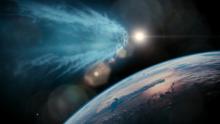cosmos

While we look out over creation, we must earnestly ask ourselves how we can participate in communion with the lands surrounding us if there is no clean water to drink, food to eat, or creation in which to delight.

Many viewers may be hoping that Cosmos: A Spacetime Odyssey lives up to the original series created by astronomer Carl Sagan 35 years ago.
But no one will watch the program, airing Sunday on Fox, with greater anticipation than nonbelievers — atheists, agnostics, humanists, and other “nones.”
Among this group, many credit Sagan and the original Cosmos with instilling in them skepticism of the supernatural and a sense of wonder about the universe. Both, they say, encouraged their rejection of institutional religion.
Humanists are especially eager. They claim Sagan as their own, and see in the Cosmos series — a multipart journey to the outer reaches of our universe — and in his dozen books a vibrant strain of their own philosophy. That philosophy favors reason over religion and holds human beings as both good and responsible for the Earth’s plight.

THE FUNCTION of healthy religion and church is to provide individuals and society with a collective container that carries the objective truth of reality for individuals. The Great Truth is too grand and transcultural to be entrusted to the vagaries of individuals and epochs. Otherwise, society becomes a massive runway for unidentifiable flying objects—each claiming absolute validity and turning their subjectivity into the only sacred.
The ground for a common civilization and shared values is destroyed if our religious experience is basically unshareable or without coherent meaning. We end up where we are today: pluralism without purpose, individuation but no community.